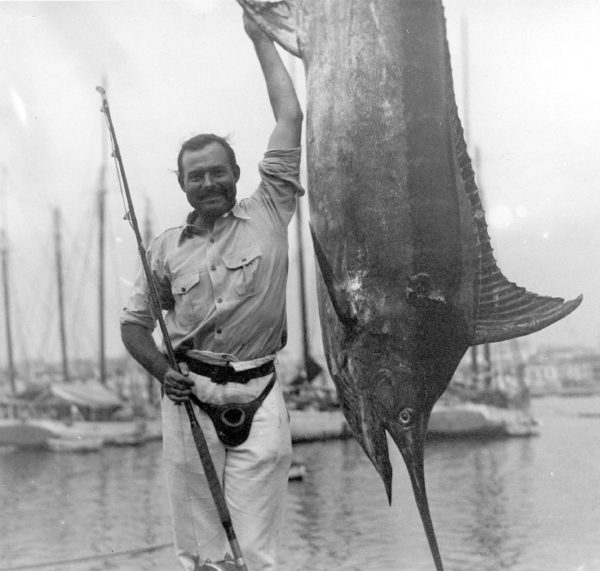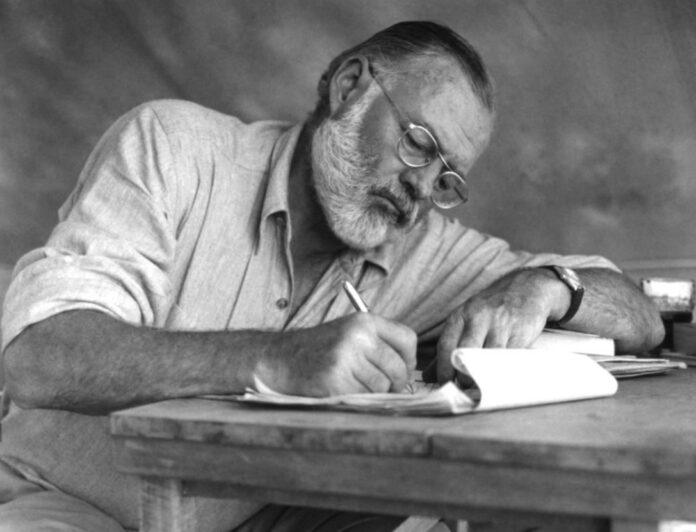Few names in American literature carry the weight of Ernest Hemingway. Born on this day in 1899 in Oak Park, Illinois, Hemingway didn’t just write stories—he lived them. The man behind The Old Man and the Sea and A Farewell to Arms spent a life chasing adventure, crafting a style that reshaped modern fiction, and earning accolades that most writers only dream of: a Pulitzer Prize in 1953, a Nobel Prize in 1954, and a permanent place in the literary pantheon.
From his earliest days, Hemingway seemed destined for larger-than-life exploits. Raised by a strict doctor father and a musically inclined mother in a suburb Frank Lloyd Wright once called a place of “so many churches for so many good people,” young Ernest learned to fish, hunt, and write with equal passion. Those skills, you could say, came in handy later.
From War Zones to Writing Rooms
If Hemingway’s life reads like an action-packed novel, that’s because he wrote it that way. At 18, he volunteered as a Red Cross ambulance driver in World War I and promptly got blown up by mortar fire. Instead of retreating, he carried a wounded soldier to safety—a feat that earned him an Italian medal and a permanent scar, both physical and emotional.
That experience bled into his fiction. In his 1929 novel, A Farewell to Arms, Hemingway captures the brutality and heartbreak of war with his signature bluntness. No flowery prose here—just sentences so tight you could bounce a coin off them.
In the 1920s, he joined the “Lost Generation” in Paris, where he rubbed elbows with literary heavyweights like Gertrude Stein and F. Scott Fitzgerald. Hemingway’s debut novel, The Sun Also Rises, distilled the ennui of post-war expatriates into prose so cool and crisp, it made other writers want to cry into their typewriters.

Big Game, Bigger Stories
Hemingway wasn’t just a man of letters—he was a man of action. He fished marlin off Cuba, hunted lions in Africa, and reported on the Spanish Civil War. Oh, and during World War II, he supposedly outfitted his boat to hunt German U-boats off the Cuban coast. Was it practical? Probably not. Was it Hemingway? Absolutely.
And yet, for all his machismo, Hemingway’s best works often reveal a deep vulnerability. His 1952 novella, The Old Man and the Sea, about an aging fisherman battling a giant marlin, reads like a parable for human perseverance. The book won him a Pulitzer, and when he snagged the Nobel Prize two years later, he humbly claimed others deserved it more. Modesty was a rare look for him, but he wore it well.
A Life of Highs and Lows
Hemingway’s later years were marred by health issues, depression, and personal struggles. After surviving two plane crashes in Africa—on consecutive days, no less—he was never the same. By 1961, he was battling the weight of his own legend, and on July 2 of that year, he tragically took his own life in Ketchum, Idaho.
Hemingway’s Legacy
Ernest Hemingway wasn’t just a writer; he was a phenomenon. He revolutionized American fiction, showing that restraint could be more powerful than embellishment. His “iceberg theory”—what’s unsaid is as important as what’s written—reshaped storytelling. Today, his works are required reading, not just for their artistry but for their insight into what it means to live boldly, love deeply, and grapple with loss.
So here’s to Hemingway: a man who lived as intensely as he wrote, proving that while life may break us all, the strongest stories come from the cracks.
If you or someone you know is struggling with thoughts of suicide, help is available. In the U.S., call or text the Suicide & Crisis Lifeline at 988 or visit 988lifeline.org for support. You are not alone.




